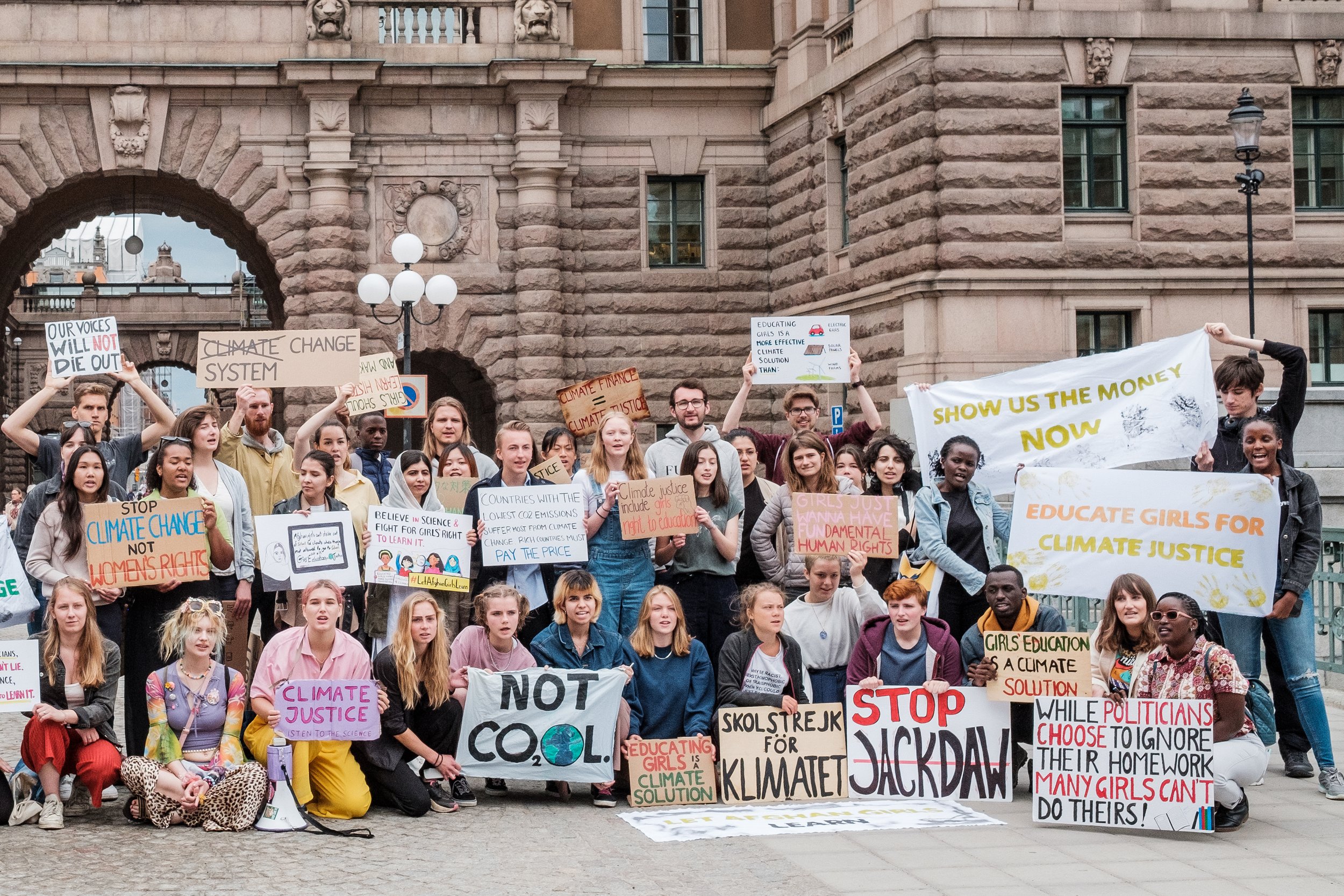This is what power looks like
Mahina shares a photo essay from the Fridays For Future climate strike in Stockholm. (Photo courtesy of Juliette Robert)
Mahina, Malala Fund’s digital associate, shares a photo essay from the Fridays For Future climate strike in Stockholm.
Gender justice. Climate change. The crisis in Afghanistan.
These urgent issues demand the world’s attention — and this generation isn't waiting for adults to take action. Young people around the world, especially girls, are speaking out, sparking movements and solving problems in their communities and beyond.
But they shouldn’t be responsible for shouldering this weight on their own. An intersectional approach to decision-making and problem-solving is essential for progress. There’s power in numbers, and when different activist movements come together we remind those in positions of authority how the issues we care about intersect.
On June 10, 2022, I attended a Fridays for Future climate strike in Stockholm, Sweden, which brought together young activists from across continents. Malala, Afghan artist Olya, climate activists Evelyn Acham, Hamira Kobusingye, Vanessa Nakate, Greta Thunberg and others from the Rise Up Movement and Fridays for Future groups were there too, joining students and teachers from across Stockholm. Together, we highlighted the link between girls’ education and climate action while also standing in solidarity with all the Afghan girls and activists who are banned from learning and unable to continue their climate work.
With placards plastered with slogans like “educate girls for climate justice” and “stop climate change, not girls’ rights,” activists stood in solidarity, reminding us that our voices become even louder when we raise them together.
Bottom right: Olya (left) and Malala (right) hold up signs voicing the link between climate justice and girls’ education. (Photo courtesy of Juliette Robert)
Bottom left: Strikers protest in front of the Swedish parliament. (Photo courtesy of Juliette Robert)
Activism can be frustrating — especially with unending empty promises from leaders and governments alike. But connecting with other passionate activists at the strike was so energizing and gave me hope for our future.
Left: Chen, a Fridays for Future Stockholm member, chants along with the crowd. (Photo courtesy of Juliette Robert)
Right: Rise Up community mobilizer Isaac Ssentumbwe (center) and Fridays for Future Japan member Yuka Fuji (left) hold up signs supporting girls’ education and the climate movement. (Photo courtesy of Juliette Robert)
Ahead, hear from the activists themselves.
Afghan artist and student, Olya. (Photo courtesy of Juliette Robert)
"I want everyone to not forget about Afghanistan and about Afghan women and girls who are suffering.”
— 22-year-old Afghan artist and student Olya, who escaped the Taliban’s ban on secondary education when she left Afghanistan two years ago
Olya and Malala at the Fridays for Future strike in Stockholm. (Photo courtesy of Juliette Robert)
“Girls in Afghanistan, young people in Afghanistan, are also a part of the Fridays for Future movement. They were also advocating for a cleaner environment, they were also speaking out … All of these issues that we talk about are interlinked.”
— Malala Yousafzai
Activists from Rise Up Movement shared how climate and extractive industries are impacting Africa — especially young women — and how African voices also need to be included in climate conversations.
Vanessa Nakate, founder of Rise Up Movement Africa. (Photo courtesy of Juliette Robert)
"When we think about solutions to tackle climate change, many times we think about renewable energy, electric vehicles and nature based solutions — which are important — but when we only consider these, we don’t realize that we have another solution: educating girls."
— Vanessa Nakate, founder of Rise Up Movement Africa
Evelyn Acham, member of Rise Up Movement. (Photo courtesy of Juliette Robert)
“We cannot have climate justice without achieving education justice. We cannot have climate justice without achieving gender equality … We have to address everything.”
— Evelyn Acham, member of Rise Up Movement and Assembly contributor
Left: Hamira, member of Rise Up Movement Africa. (Photo courtesy of Juliette Robert)
“Let’s see what effective and equitable climate action can do for our communities.”
— Hamira, member of Rise Up Movement Africa, shared how extractive industries in Africa displace girls and called on European climate activists to hold their governments accountable for bringing fossil fuels to Africa.
And Fridays for Future activists took to the mic, reminding their fellow activists that they have equal responsibility to support girls across the world in accessing education.
Denise, Fridays for Future Stockholm member from Italy. (Photo courtesy of Juliette Robert)
“My duty and our duty of all of the people that were born in the Western world is to fight for this [girls' education] and stand in this battle with you.”
— Denise, Fridays for Future Stockholm member from Italy
Greta Thunberg, Fridays for Future founder. (Photo courtesy of Juliette Robert)
“Climate justice equals social justice and social justice equals gender equality. If we do not care for the people who are most vulnerable to this crisis — which is in many cases girls, especially from the most affected areas — if we don’t do that, there is no climate justice.”
— Greta Thunberg, Fridays for Future founder
Olya, Malala, Hamira, Vanessa and Evelyn. (Photo courtesy of Juliette Robert)
Injustice doesn’t exist in isolation: the more we understand how our issues intersect, the stronger we are. And when activists from across movements stand together in solidarity, we make our voices heard. Together, we can build a more equitable and sustainable future.
 Read more
Read more




















